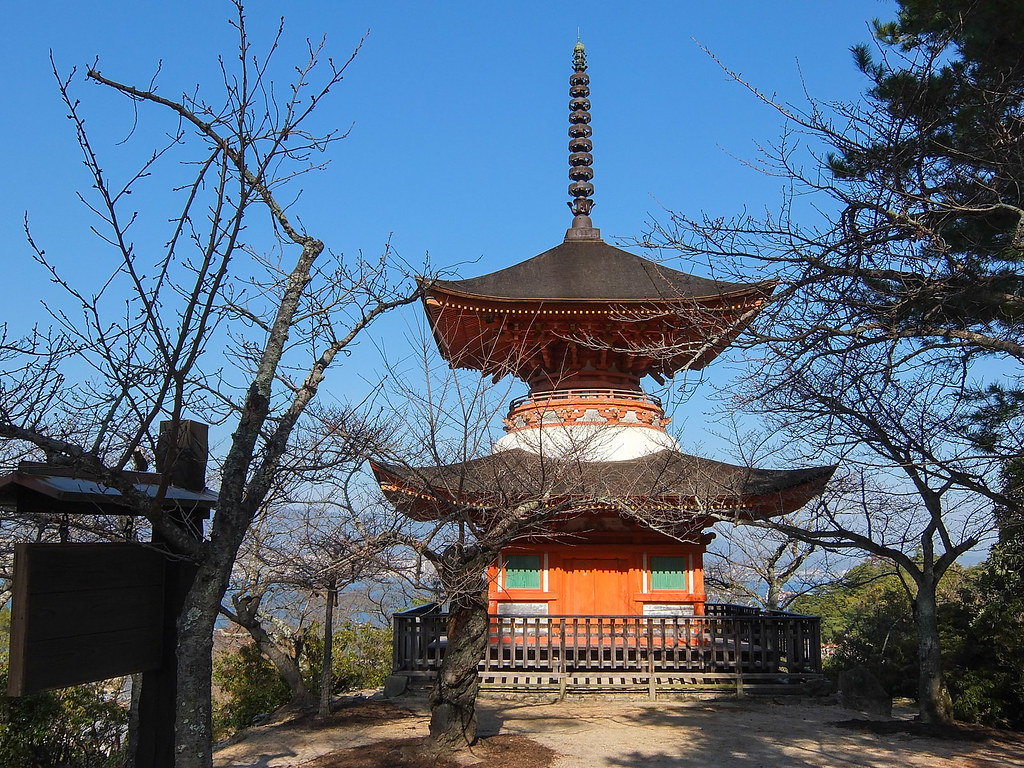Have you ever stumbled upon a place so enchanting that it leaves an indelible mark on your soul, whispering to you in the quietest moments to come back? That’s exactly how I feel about Miyajima Island, a gem nestled in the western part of the Inland Sea of Japan. Known as Shrine Island, Miyajima is a place where the divine seems to touch the earth, with its serene beauty and spiritual aura enveloping every visitor in a tranquil embrace.
Miyajima’s Natural and Spiritual Treasures
Miyajima, or Itsukushima, is not just an island; it’s a living tapestry of Japan’s rich cultural and natural heritage. The island’s most iconic sight, the ‘floating’ torii gate of Itsukushima Shrine, is a marvel that welcomes visitors into a world where the sacred and the earthly blend seamlessly. This magnificent gate, appearing to float at high tide, serves as the threshold to a realm where humans and nature have coexisted in harmony for centuries. The shrine itself, a UNESCO World Heritage Site, stands as a testament to the island’s historical significance and the meticulous preservation of its traditions.
But Miyajima’s allure doesn’t end with its shrines and temples. The island is a haven for nature lovers, with its lush forests, vibrant autumn foliage, and the serene beauty of Mount Misen. Whether you’re gazing out at the Inland Sea from the peak of Mount Misen or wandering through the maple-lined paths, every corner of Miyajima offers a postcard-perfect scene. The changing tides of the Seto Inland Sea add a dynamic beauty to the landscape, revealing the seabed at low tide and transforming the shrine boardwalk into a path over the water at high tide.
The island’s fauna, particularly the sika deer roaming freely through its streets, adds another layer to its charm. Considered sacred messengers of the gods in Shinto belief, these gentle creatures embody the island’s spiritual essence. They roam the streets and shrines, unafraid of visitors, further blurring the lines between the wild and the cultivated, the divine and the mundane.
Miyajima’s Distinctive Charm
Beyond its natural and spiritual treasures, Miyajima is a place of delightful discoveries. From the delicious Momiji manjū, a pastry emblematic of the island, to the unique shamoji, wooden paddles invented here for serving rice, every aspect of Miyajima tells a story. Craftspeople and vendors honor the island’s heritage by offering these and other items, like the outsized examples of shamoji around the shopping district, as souvenirs that carry the essence of Miyajima back home with visitors.
The island is not just a static relic of the past; it’s a vibrant community that works tirelessly to preserve its natural and cultural heritage. With no traffic signals and a landscape more inclined to host deer than cars, Miyajima offers a rare glimpse into a slower, more thoughtful way of life. It’s a place where the preservation of forests and respect for nature are not just ideals but everyday practices. The islanders’ dedication to maintaining the beauty and sanctity of Miyajima is evident in everything from the careful management of tourist activities to the conservation of its forests and wildlife.
In exploring Miyajima, one cannot help but feel a deep connection to Japan’s historical and natural wonders. The island’s temples and shrines, including the striking Five-storied Pagoda and the serene Daishō-in Temple, offer a journey through the spiritual heart of Japan. Each site, from the grandeur of Itsukushima Shrine to the tranquility of Daishō-in, is imbued with stories and legends that have shaped the island’s identity over centuries.

As we delve deeper into the wonders of Miyajima, it becomes clear that this island is more than just a destination; it’s a sanctuary. A place where the hustle and bustle of the modern world fade away, leaving only the gentle rustle of leaves, the quiet prayers at shrines, and the soft footfalls of deer. It’s a reminder of the beauty that arises when we live in harmony with nature, respecting its rhythms and its gifts.
As we explore Miyajima, let’s embrace the island not only as tourists but as pilgrims seeking connections with a world that is both ancient and ever-new. Let’s wander its paths with open hearts, ready to be touched by its magic, and maybe, like me, you will find yourself longing to return before you have even left.
A Personal Journey: Experiencing Miyajima’s Magic Firsthand
Stepping onto the ferry bound for Miyajima, I felt a mix of excitement and anticipation. The gentle sway of the boat and the cool sea breeze was the perfect prelude to the adventure that awaited. As the ferry cut through the waters of the Inland Sea, I couldn’t help but think about the rich history and natural beauty that was so closely intertwined with this sacred island.
The first glimpse of the O-torii Gate as it came into view was nothing short of magical. Rising majestically from the waters, it stood as if guarding the island from the mundane, inviting only those willing to appreciate its sacredness. It was high tide, and the gate seemed to float, an ethereal sight that left me in awe. The anticipation built as we drew closer, each moment etching deeper into my memory.
Disembarking from the ferry, I was greeted by the serene beauty of Miyajima. The sacred deer, unbothered by our human presence, roamed freely, adding to the mystical atmosphere. Their gentle demeanor and curious eyes seemed to welcome me, a traveler from afar, into their home. It was a gentle reminder of the harmonious coexistence between man and nature that Miyajima epitomized.
As I walked toward the Itsukushima Shrine, the enchanting beauty of the island unfolded with each step. The lush greenery, the tranquil sea, and the vibrant hues of the temples and shrines created a panorama that was breathtaking. The shrine itself, with its unique architecture that ‘floated’ at high tide, was a testament to the ingenious harmony between human creativity and nature’s grandeur.
The climb up Mount Misen offered a different perspective of Miyajima. The ropeway ride and subsequent hike were filled with anticipation, each turn revealing stunning vistas of the island and the surrounding sea. Reaching the summit, I was rewarded with a panoramic view that was simply spectacular. The sight of the Seto Inland Sea, stretching into the horizon, was a moment of profound peace and reflection.

Exploring the temples and pagodas on the island, each with its own story and charm, was a journey through time. Daisho-in Temple, with its spiritual ambiance and historical significance, was particularly memorable. The spinning wheels with Buddhist sutras offered a unique way to connect with the teachings and blessings of Buddhism. The 500 rakan statues, each with its distinct expression, felt like a silent congregation of wisdom and compassion.
One of the highlights of my visit was experiencing the local cuisine. The Momiji manjū, a delightful pastry filled with sweet red bean paste, was a treat that captured the essence of Miyajima. Each bite was a blend of tradition and flavor, a reminder of the island’s cultural richness.
As I took the ferry back, leaving Miyajima behind, I realized that the island had left an indelible mark on my heart. The beauty, serenity, and spiritual depth of Miyajima was a powerful reminder of the beauty that exists when we live in harmony with nature and honor our traditions. It was not just a visit, but a pilgrimage that touched my soul.
In reflecting on my journey to Miyajima, it’s clear that the magic of the island is not just in its natural beauty or its historical sites. It’s in the feeling it evokes, a sense of peace and wonder that stays with you long after you’ve left. Miyajima is a testament to the enduring allure of places that exist at the intersection of nature, spirituality, and humanity. It’s a reminder that sometimes, the most beautiful journeys are those that bring us closer to understanding the sublime elegance of the world around us.
Related posts:
Exploring Japan’s Miyajima Island: 7 Things That Make It a Traveler Favorite
Visit Miyajima Island When In Hiroshima





